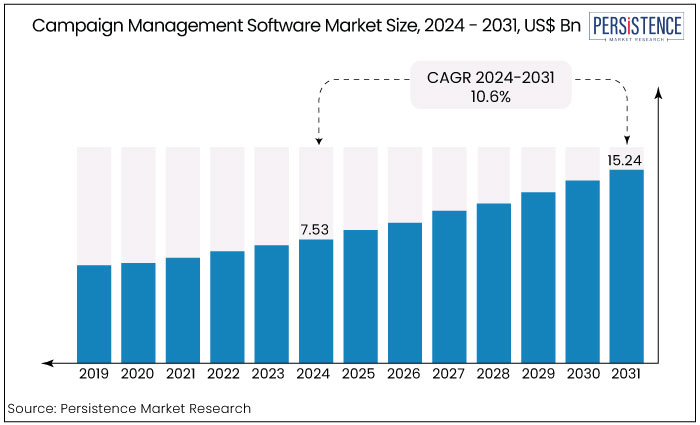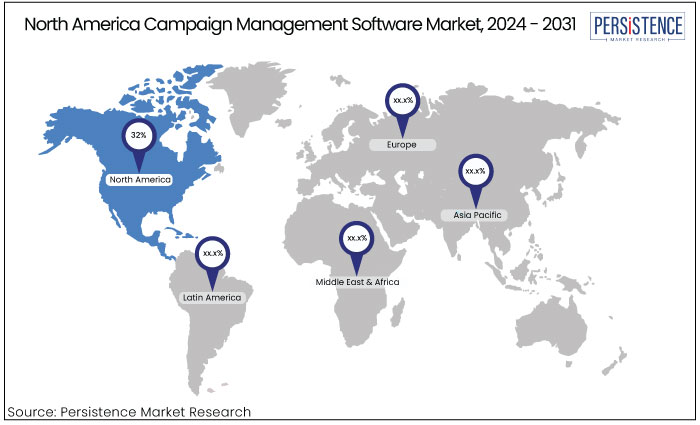Industry: IT and Telecommunication
Published Date: November-2024
Format: PPT*, PDF, EXCEL
Delivery Timelines: Contact Sales
Number of Pages: 191
Report ID: PMRREP34889
The campaign management software market is estimated to increase from US$7.53 Bn in 2024 to US$15.24 Bn by 2031. The market is projected to record a CAGR of 10.6% during the forecast period from 2024 to 2031.
Nearly 80% of marketer’s report prioritizing personalization in campaigns, driving the adoption of sophisticated campaign management tools. With companies using an average of 5-7 marketing channels, campaign management software has become essential for unifying and optimizing customer engagement across platforms. Around 60% of campaign management solutions now incorporate AI-driven features, including predictive analytics, automated A/B testing, and customer segmentation enhancing marketers' ability to deliver personalized, data-driven campaigns.

Key Highlights of the Market
|
Market Attributes |
Key Insights |
|
Campaign Management Software Market Size (2024E) |
US$7.53 Bn |
|
Projected Market Value (2031F) |
US$15.24 Bn |
|
Global Market Growth Rate (CAGR 2024 to 2031) |
10.6% |
|
Historical Market Growth Rate (CAGR 2019 to 2023) |
9.5% |
|
Region |
Market Share in 2024 |
|
North America |
32% |
North America to dominate campaign management software market securing a share of 32% in 2024. The region possesses a developed digital advertising ecosystem, enabling firms to utilize advanced marketing techniques to improve client engagement and increase sales.
North America's robust regulatory structure and compliance with data protection regulations enhance customer trust prompting corporations to invest in extensive campaign management systems.
The United States, characterized by a dynamic economy and numerous inventive technology firms excels in digital marketing ideas and their implementation. U.S. companies emphasize data-driven marketing strategies, employing advanced analytics and AI tools to enhance campaign performance and return on investment.

|
Category |
Market Share in 2024 |
|
Functionality - Marketing & Communication Firms |
26% |
The market is divided into consulting firms, marketing & communication firms, technology companies, architecture & construction firms, research firms, and accounting firms based on functionality. Among these, the marketing & communication firms segment dominates the market.
Marketing & communication firms are the dominant segment in terms of functionality holding an estimated 37% market share as of 2024. Segment growth is driven by the high reliance of these firms on digital tools to manage complex, multi-channel campaigns that require targeted customer engagement strategies.
Marketing and communication firms leverage campaign management software for automating workflows, real-time performance tracking, and optimizing content delivery across multiple platforms. Firms in this segment prioritize software with advanced analytics, AI capabilities, and CRM integrations with the growing emphasis on data-driven marketing to enhance personalization and improve return on investment (ROI).
The rise of Omni channel marketing strategies and increased spending on digital advertising have made campaign management software essential in streamlining operations, maximizing reach, and maintaining consistent brand messaging.
|
Category |
Market Share in 2024 |
|
End Use - Retail |
26% |
Based on end use, the market is divided into retail, BFSI, healthcare, it & telecom, education, media & entertainment, and government. Among these, the retail sector dominates the market.
Retail businesses, both online and brick-and-mortar depend completely on campaign management software to target, engage, and retain customers in an increasingly competitive market.
Retailers leverage campaign management software to manage personalized marketing campaigns, customer loyalty programs, and targeted promotions based on customer preferences and purchasing behavior. With the shift toward omnichannel marketing, retail companies use these tools to deliver a cohesive experience across digital and physical touchpoints including email, social media, SMS, and in-store promotions.
Advanced capabilities such as AI-driven recommendations, predictive analytics, and real-time data analytics allow retailers to create highly personalized campaigns, which enhance customer engagement, increase conversion rates, and drive sales.
Campaign Management Software helps marketing professionals automate the laborious duties of launching, planning, and analysing the impact of marketing campaigns. It can effortlessly manage a multitude of tasks simultaneously, including emails, webinars, and surveys, for various campaigns operating simultaneously or for different campaigns.
Enhanced cooperation, data-driven decision-making, and greater efficiency are some of the benefits that may be gained from using the software.
The gathering and examination of data are essential components of campaign management, as they allow for the determination of how well a campaign is doing. The software that manages campaigns enables the collection and analysis of data, which assists in shifting funding from a channel that is not doing as well to a channel that is performing exceptionally well.
Many organizations shifted to online and omnichannel marketing, elevating demand for tools to manage complex campaigns across multiple channels during the period from 2019 to 2023.
During this period, the market exhibited a CAGR of approximately 9.5%, bolstered by investments in AI, automation, and CRM integrations that enabled marketers to reach customers with personalized and targeted campaigns.
The rising popularity of social media and e-commerce also accelerated software adoption, especially in sectors like retail, BFSI, and media & entertainment. Post-2024, the market is projected to expand, with a forecasted CAGR of 10.6% through 2031. Key drivers for this growth include the proliferation of AI-driven features such as predictive analytics and customer segmentation, which enable marketers to optimize campaign effectiveness and maximize ROI.
Regulatory pressures around data privacy are expected to drive demand for software that can comply with stringent data protection laws like GDPR and CCPA. The rise in remote and hybrid work models further contributes to this demand as companies seek cloud-based, collaborative platforms for managing campaigns across distributed teams. With these advancements, the market is poised for robust growth as digital marketing continues to evolve.
Adoption of Multichannel and Omni Channel Marketing Approaches
Businesses increasingly adopt multichannel and Omni channel marketing strategies to reach audiences wherever they are as consumers engage with brands across diverse digital and physical channels.
Campaign management software facilitates seamless integration and coordination across channels like email, social media, websites, and in-store promotions, providing a unified customer experience that encourages engagement and conversion. This approach allows marketers to manage, track, and optimize real-time campaigns, adapting to customer interactions across multiple touchpoints.
With Omni channel campaigns, companies can build consistent, cohesive messaging that follows customers from one platform to another, creating a seamless experience that increases brand loyalty.
Campaign management software has become essential for companies looking to provide this level of integration, as it enables them to centralize campaign operations, streamline workflows, and measure performance across channels. This capability is crucial for retail, media, and e-commerce sectors, where customer journeys frequently span multiple channels.
Increasing Emphasis on Data-Driven Marketing
The rise of data-driven marketing is a significant growth driver for the campaign management software market as organizations increasingly prioritize targeted, personalized campaigns to engage customers effectively.
Campaign management software enables businesses to create more precise customer segments and optimize messaging by leveraging data from CRM systems, customer transactions, and online behaviour. These platforms often incorporate advanced analytics and AI, which offer predictive insights and automate segmentation, enhancing campaign accuracy and improving return on investment (ROI).
As digital channels proliferate, companies face the challenge of unifying and analysing massive amounts of data to create relevant and timely campaigns. Campaign management software has become indispensable in helping marketers harness this data to deliver personalized experiences that meet evolving customer expectations. The push toward data-driven marketing has driven organizations across retail, BFSI, and telecommunications to adopt these platforms positioning the software as a foundational tool in modern marketing strategies.
Data Privacy Regulations and Compliance Costs
Stringent data privacy regulations, such as GDPR in Europe and CCPA in California, present a notable growth restraint in the campaign management software market. Compliance with these regulations requires robust data protection features, including encryption, customer data anonymization, and privacy settings management.
For campaign management software providers, the ongoing adjustments and updates to comply with evolving regulations can be costly, especially for smaller companies without extensive resources. Non-compliance can result in fines and damage to brand reputation, leading companies to be cautious in their software adoption.
With consumer awareness about data privacy on the rise, customers demand more control over their data, impacting how campaign management tools handle data collection and usage. As privacy laws evolve, companies may face increased compliance costs, impacting software adoption and growth in certain markets.
Expansion of Omni Channel Marketing Strategies
The shift to omni channel marketing strategies offers a critical growth opportunity for campaign management software providers. As consumers engage across multiple channels, from social media and email to physical stores and mobile apps, brands increasingly seek to deliver cohesive experiences throughout the customer journey.
Campaign management platforms can support this by providing tools that seamlessly manage, track, and adjust campaigns across various touchpoints. Coordinating messaging and timing across channels enables brands to offer consistent interactions driving customer loyalty and retention.
The demand for software that can unify operations across digital and offline channels is expected to rise with omni channel strategies becoming the norm, especially in retail, BFSI, and media sectors. Vendors who provide highly integrated, user-friendly solutions for managing multichannel campaigns are well-positioned to capture this growing market segment.
The competitive landscape of the campaign management software market is characterized by a mix of established players and emerging startups, each vying for market share through innovative features and robust integrations.
Key players include Salesforce, Adobe, HubSpot, and Oracle, which are known for their comprehensive solutions offering advanced analytics, AI-driven insights, and omnichannel capabilities. These companies focus on enhancing user experience and integrating with other marketing technologies to streamline campaign execution.
Niche players are emerging, offering specialized solutions tailored to specific industries like retail, healthcare, and BFSI. The market is increasingly characterized by strategic partnerships, acquisitions, and continuous updates to meet evolving consumer demands and compliance requirements, intensifying competition and driving innovation across the sector.
Recent Industry Developments in the Campaign Management Software Market
|
Attributes |
Details |
|
Forecast Period |
2024 to 2031 |
|
Historical Data Available for |
2019 to 2023 |
|
Market Analysis |
US$ Billion for Value |
|
Key Regions Covered |
|
|
Key Market Segments Covered |
|
|
Key Companies Profiled in the Report |
|
|
Report Coverage |
|
|
Customization & Pricing |
Available upon request |
By Functionality
By End Use
By Region
To know more about delivery timeline for this report Contact Sales

The market is estimated to be valued at US$15.24 Bn by 2031
The market is estimated to secure a CAGR of 10.6% over the forecast period.
Microsoft Corporation, Autotask Corporation, Salesforce.com Inc., are some of the key players in the market.
North American region dominates the market.
Retail sector leads the market with significant market share.